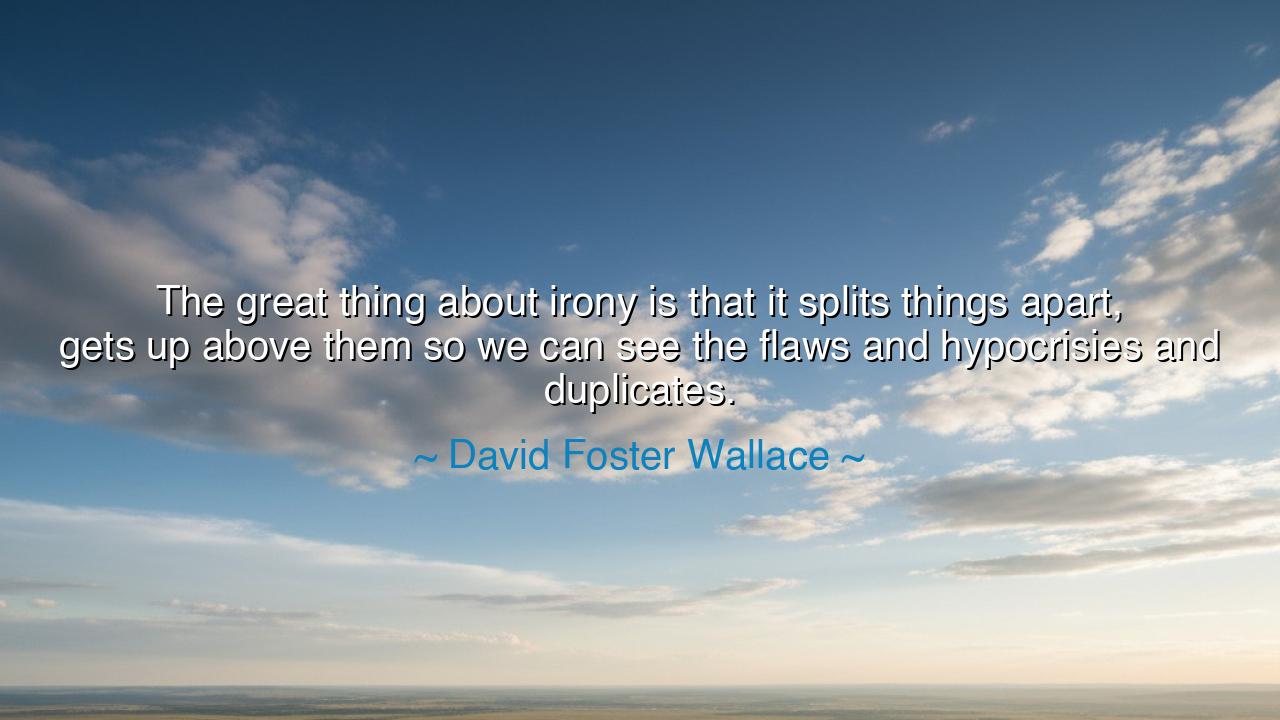
The great thing about irony is that it splits things apart, gets
The great thing about irony is that it splits things apart, gets up above them so we can see the flaws and hypocrisies and duplicates.






Hearken, O seekers of wisdom, and attend to the words of David Foster Wallace, a voice that pierced the veils of perception and culture, who proclaimed: “The great thing about irony is that it splits things apart, gets up above them so we can see the flaws and hypocrisies and duplicates.” At first glance, these words may appear a reflection on wit or literary style, yet beneath them lies a profound meditation on perception, clarity, and the examination of truth through detachment and reflection. The ancients understood that to see fully, one must rise above the immediate, to observe without surrendering to bias, and to discern the hidden patterns and contradictions in human life.
Wallace begins with the principle of detachment as revelation. Irony, in its essence, creates a distance from the subject, allowing the observer to step back and perceive what is normally obscured. The Greek tragedians and philosophers practiced this form of scrutiny: Socrates, through questioning, lifted his interlocutors above their own assumptions, revealing contradictions and hidden errors. Similarly, irony permits the mind to ascend, to recognize the incongruities of speech, action, and belief, and thus see the world more clearly.
The essence of Wallace’s wisdom lies in the illumination of flaws and hypocrisies. To employ irony is to expose the imperfections that lie beneath polished surfaces. Consider the satires of Juvenal or the critiques of Voltaire: through sharp wit and observation, they revealed the duplicities and pretensions of their societies. Wallace asserts that irony is not mere ridicule—it is a tool of insight, a lens through which the hidden duplicities and moral inconsistencies of life are revealed for contemplation and correction.
Wallace’s reflection also speaks to the power of perspective. By “getting up above” the subject, one achieves a vantage point from which complexity is clarified. History offers many such examples: the philosopher-statesman Marcus Aurelius, from the heights of the Roman Empire, reflected upon the follies and ambitions of men, discerning the recurrent flaws that could blind leaders and citizens alike. In Wallace’s formulation, irony functions as this elevated perspective, enabling judgment tempered by observation, rather than impulse.
The quote further illuminates the creative and ethical potential of irony. It is not merely a literary device, but a method of engaging critically with the world, recognizing duplications of folly and repeating patterns of human error. Leonardo da Vinci, in observing the duplications of nature and the flaws of human invention, employed a form of ironic distance in his studies, noting what was flawed or contradictory to improve and innovate. Wallace’s insight teaches that to see clearly, one must sometimes step apart, embrace detachment, and confront contradictions with discernment.
From this reflection emerges a practical teaching: cultivate the habit of observation, not simply of judgment. Step aside from immediate assumptions and expectations; lift your mind above the noise of emotion and conformity to recognize patterns, errors, and duplications in thought and action. Irony, wisely applied, is not cynicism but clarity, allowing one to perceive the truth beneath appearances.
Practically, this calls for awareness in both self and society. Question narratives, examine motives, and embrace subtlety in thought. Allow yourself to notice contradictions in your own reasoning and the duplicities of others, but temper insight with empathy. Like Wallace, the keen observer uses irony as a tool to illuminate, not to wound, revealing truths that might otherwise remain hidden.
Thus, let it be known: irony is a lens of elevated perception, revealing flaws, hypocrisies, and duplications that shape human life. Use it wisely, to discern and reflect, not merely to mock. In this mindful engagement, one cultivates clarity, wisdom, and the courage to confront both personal and societal inconsistencies, walking the path of understanding with both insight and compassion.






AAdministratorAdministrator
Welcome, honored guests. Please leave a comment, we will respond soon